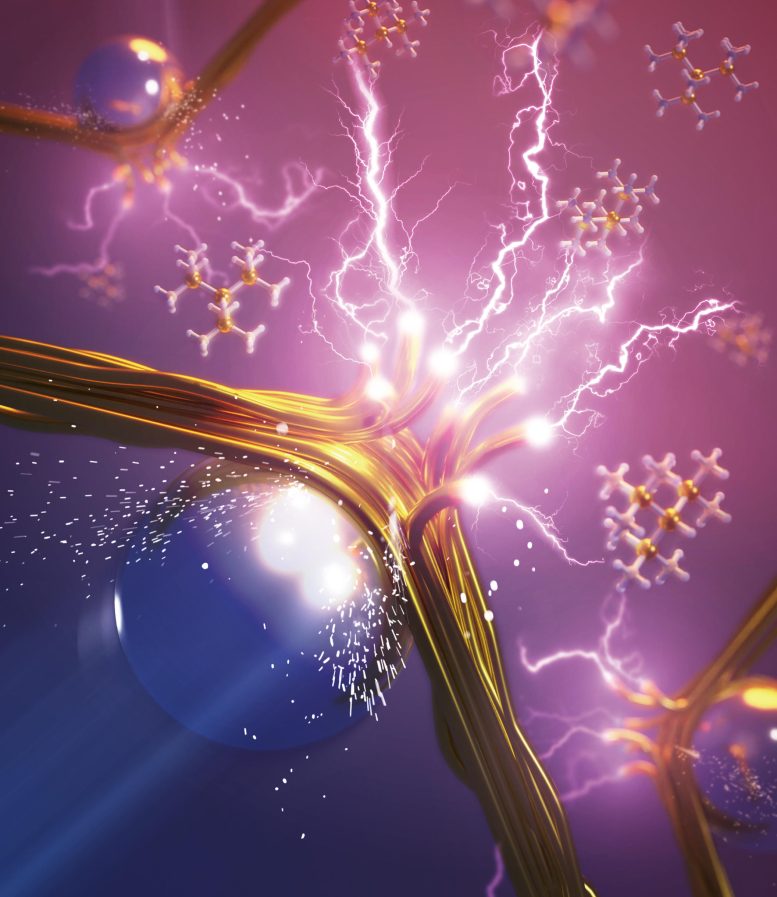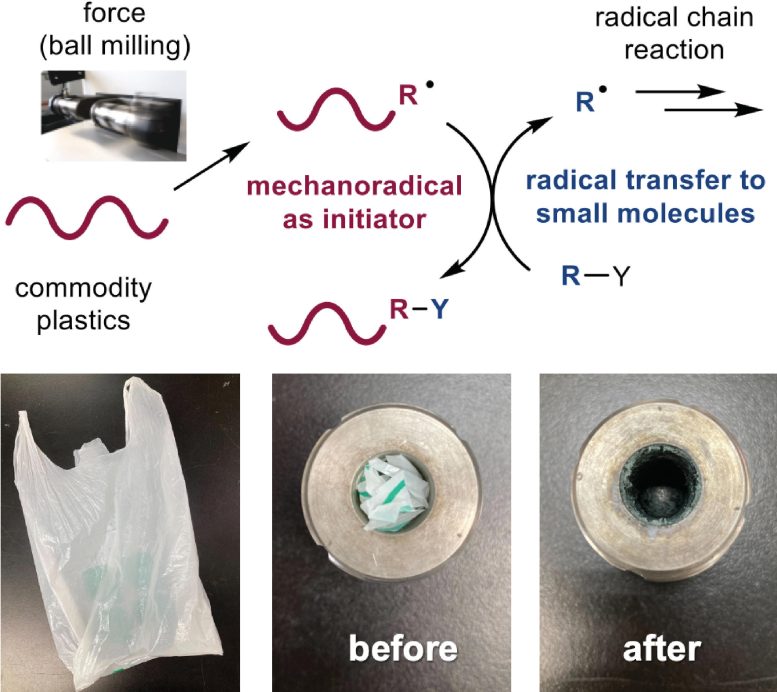[ad_1]

Hokkaido College researchers have developed a groundbreaking methodology to repurpose plastic waste through the use of it to provoke radical chain reactions for detoxifying hazardous chemical compounds. This method, which boosts security and effectivity whereas addressing the environmental problem of plastic waste, paves the best way for sustainable and economically engaging chemical processes. Creative depiction of extraordinarily reactive molecules referred to as radicals being generated from plastic fibers. Credit score: Koji Kubota and Hajime Ito
Scientists use on a regular basis plastics to provoke revolutionary chain reactions, growing a way to recycle plastic waste and enhance each security and effectivity within the course of.
Single-use plastics are a serious environmental concern, however now, relatively than being disposed of as rubbish, used plastic baggage from the grocery shops could possibly be utilized to hold out a response that may detoxify hazardous chemical compounds.
A workforce led by researchers on the Institute for Chemical Response Design and Discovery (WPI-ICReDD), Hokkaido College has developed a way that makes use of widespread plastic supplies as a substitute of probably explosive compounds to provoke radical chain reactions. This method considerably will increase the security of the method whereas additionally offering a method to reuse widespread plastics akin to polyethylene and polyvinyl acetate. These findings have been revealed within the Journal of the American Chemical Society.

(Prime) Basic scheme for utilizing mechanical power to set off a radical chain response. (Backside) Shreds of a grocery bag have been utilized to provoke a response in a ball mill jar. Credit score: Koji Kubota, et al. Journal of the American Chemical Society. December 22, 2023
Researchers utilized a ball mill, a machine that quickly shakes a metal ball inside a metal jar to combine stable chemical compounds. When the ball slams into the plastic, the mechanical power breaks a chemical bond to type radicals, which have a extremely reactive, unbonded electron. These radicals facilitated a self-sustaining chain response that promotes dehalogenation— i.e., the substitute of a halogen atom with a hydrogen atom—of natural halides.
Enhancing Chemical Processes
“The usage of commodity plastics as chemical reagents is a totally new perspective on natural synthesis,” stated Affiliate Professor Koji Kubota. “I imagine that this method will result in not solely the event of protected and extremely environment friendly radical-based reactions, but additionally to a brand new method to make the most of waste plastics, that are a critical social downside.”

Affiliate Professor Koji Kubota (left) and Professor Hajime Ito (proper) of the analysis workforce on the Institute for Chemical Response Design and Discovery (WPI-ICReDD), Hokkaido College. Credit score: WPI-ICReDD
The reuse of waste plastic was demonstrated by including plastic shreds of a typical grocery bag to the ball mill jar and efficiently finishing up the response. The workforce additionally confirmed their methodology could possibly be utilized to the therapy of extremely poisonous polyhalogenated compounds, that are extensively utilized in trade. Polyethylene was employed to provoke a radical response that eliminated a number of halogen atoms from a compound generally used as a flame retardant, thus decreasing its toxicity.
Researchers anticipate this methodology will garner the eye of the trade as a result of its benefits in value and security.
“Our new method utilizing steady, low cost, and considerable plastic supplies as initiators for radical chain reactions holds the numerous potential to foster the event of industrially engaging, protected, and extremely environment friendly chemical processes,” commented Professor Hajime Ito.
The research was funded by the Japan Society for the Promotion of Science, the Japan Science and Expertise Company, and the Ministry of Training, Tradition, Sports activities, Science and Expertise of Japan
[ad_2]
Supply hyperlink

